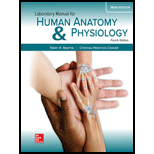
Concept explainers
To explain biological phenomena, scientists use a technique called
- the scientific method.
- the scientific law.
- conclusions.
- measurements.
Introduction:
The scientific method is a series of different steps that can be used to collect knowledge about different biological phenomena. This technique involves five different methods. It starts with making observations, asking questions, formulating a hypothesis, carrying out an experiment, analyzing data, and creating a conclusion. Scientific experiments are examples of the scientific method.
Answer to Problem 1PL
Correct answer:
The correct answer is option (a) the scientific method.
Explanation of Solution
Explanation/justification for the correct answer:
Option (a).The scientific method. The scientific method is used to collect evidence in an experiment related to the hypothesis that supports or contradicts the theory. It is a technique that involves a series of steps to experiment. So, the correct answer is option (a)
Explanation for incorrect answer:
Option (b).Scientific law. The scientific law explains observations in the form of a verbal statement or a mathematical equation. It is different from the hypothesis and based on observation only. So, this is an incorrect option.
Option (c).Conclusions. Conclusions are a summary of the experiment. For a cause-effect experiment, the conclusion predicts whether the result of the experiment supports the hypothesis or not. So, this is an incorrect answer.
Option (d).Measurements. Measurements are a collection of quantitative data that describe the property of an object. Measurements are part of the scientific method. So, this is an incorrect answer.
Want to see more full solutions like this?
Chapter 1 Solutions
Laboratory Manual for Human Anatomy & Physiology Main Version
- The scientific method is a set of techniques for gaining new knowledge about the world in which we live. However, these techniques come with a rigid set of rules that are sometimes misinterpreted. Identify the statements that accurately describe science and the scientific method. Scientific hypotheses are educated guesses that can be disproven by experiments. Science is a process that is limited to answering questions about the natural world. Science is a process that is not limited by the types of questions it can answer. Scientific findings can always be relied upon as fact. Scientific findings are based on carefully tested and scrutinized observations. Scientific theories are concrete and indisputable explanations for natural phenomena.arrow_forwardDiscuss the process of scientific thinkingarrow_forwardWhy is there a need for a scientist to know the limitations of science? Does this not affect their credibility as scientist? *arrow_forward
- Consider the steps involved in an experiment that uses the scientific method. Arrange the six given steps in the order in which they occur. One of the steps will not be used. First step of investigation Final step of investigation Answer Bank Share the results and conclusions of the experiment. Choose the data that are most likely to support the hypothesis and ignore the rest of the data. Conduct the experiment and collect the resulting data. Make observations that raise a question about some aspect of a natural phenomenon. Analyze the data collected in the experiment. Form a hypothesis that can answer the question about the natural phenomenon. Design an experiment that tests the hypothesis.arrow_forwardIn terms of the scientific method, define – variable, control, dependent variable, independent variable.arrow_forwardWhich statement below correctly identifies the difference between laws and theories? Laws describe phenomena, while theories explain why phenomena exist. Laws are a statement of fact, while theories are a statement of opinion. Laws explain why phenomena exist, while theories explain how. Laws are a prediction of phenomena, while theories are an explanationarrow_forward
- Explain the different parts of the scientific method and how it builds on itself.arrow_forwardComplete the following sentence so that it is correct: Scientific theories are based on...arrow_forwardIt is a statement of what occurs in nature as found by observation and a series of experiments to be true. Select the correct response: Scientific Principle Scientific Law Theory Hypothesisarrow_forward
- List and explain four products of sciencearrow_forwardWhich of the following statements would not be a barrier to scientific inquiry? Choose all that apply. A hypothesis that includes an explanation for an observation. Predictions that stem logically from the hypothesis. Errors in data collection. Unsupported conclusions (the conclusions do not stem from the results of the experiment).arrow_forwardDescribe what science is, and then discuss what science can and cannot be applied toarrow_forward
 Human Biology (MindTap Course List)BiologyISBN:9781305112100Author:Cecie Starr, Beverly McMillanPublisher:Cengage Learning
Human Biology (MindTap Course List)BiologyISBN:9781305112100Author:Cecie Starr, Beverly McMillanPublisher:Cengage Learning Concepts of BiologyBiologyISBN:9781938168116Author:Samantha Fowler, Rebecca Roush, James WisePublisher:OpenStax College
Concepts of BiologyBiologyISBN:9781938168116Author:Samantha Fowler, Rebecca Roush, James WisePublisher:OpenStax College Biology Today and Tomorrow without Physiology (Mi...BiologyISBN:9781305117396Author:Cecie Starr, Christine Evers, Lisa StarrPublisher:Cengage Learning
Biology Today and Tomorrow without Physiology (Mi...BiologyISBN:9781305117396Author:Cecie Starr, Christine Evers, Lisa StarrPublisher:Cengage Learning- Essentials Health Info Management Principles/Prac...Health & NutritionISBN:9780357191651Author:BowiePublisher:Cengage
 Biology 2eBiologyISBN:9781947172517Author:Matthew Douglas, Jung Choi, Mary Ann ClarkPublisher:OpenStax
Biology 2eBiologyISBN:9781947172517Author:Matthew Douglas, Jung Choi, Mary Ann ClarkPublisher:OpenStax





